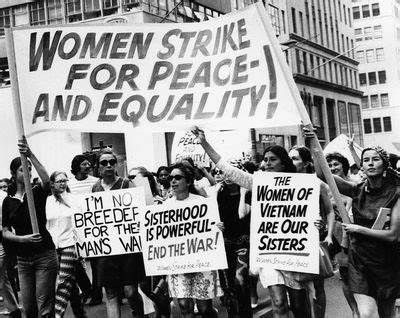Welcome to THE MAKING OF A NATION – American history in VOA Special English. I'm Steve Ember. Today, we tell about life in the United States during the nineteen sixties. The nineteen sixties began with the election of the first president born in the twentieth century, John Kennedy. For many Americans, the young president was the symbol of a spirit of hope for the nation. When Kennedy was murdered in nineteen sixty-three, many felt that their hopes died, too. This was especially true of young people, and members and supporters of minority groups.
A time of innocence and hope soon began to look like a time of anger and violence. Many Americans protested to demand an end to the unfair treatment of black citizens. Many more protested to demand an end to the war in Vietnam. And many protested to demand full equality for women. By the middle of the nineteen sixties, it had become almost impossible for President Lyndon Johnson to leave the White House without facing protesters against the war in Vietnam. In March of nineteen sixty-eight, Johnson announced that he would not run for another term in office. In addition to President Kennedy, two other influential Americans were murdered during the nineteen sixties. Civil rights leader Martin Luther King Junior was shot in Memphis, Tennessee, in nineteen sixty-eight. Several weeks later, Robert Kennedy -- John Kennedy's brother -- was shot in Los Angeles, California. He was campaigning to win his party's nomination for president. The two murders resulted in riots in cities across the country.

The unrest and violence affected many young Americans. The effect seemed especially bad because of the time in which they had grown up. By the middle nineteen fifties, most of their parents had jobs that paid well. They expressed satisfaction with their lives. They taught their children what were called middle class values. These included a belief in God, hard work and service to their country. Later, many young Americans began to question these beliefs. They felt that their parents' values were not enough to help them deal with the social and racial difficulties of the nineteen sixties. They rebelled by letting their hair grow long and by wearing unusual clothing. Their dissatisfaction was strongly expressed in music. Rock and roll music had become very popular in America in the nineteen fifties. Some people, however, did not approve of it. They thought it was too sexual. These people disliked the rock and roll of the nineteen sixties even more. They found the words especially unpleasant.
The musicians themselves thought the words were extremely important. As singer and song writer Bob Dylan said, "There would be no music without the words." Bob Dylan produced many songs of social protest. He wrote antiwar songs before the war in Vietnam became a violent issue in the United States. One was called "Blowin' in the Wind." In addition to songs of social protest, rock and roll music continued to be popular in America during the nineteen sixties. The most popular group, however, was not American. It was British -- the Beatles -- four rock and roll musicians from Liverpool. The Beatles' song "I Want to Hold Your Hand" went on sale in the United States at the end of nineteen sixty-three. Within five weeks, it was the biggest-selling record in America. Other songs, including some by the Beatles, sounded more revolutionary. They spoke about drugs and sex, although not always openly. In the nineteen sixties, "Do your own thing" became a common expression. It meant to do whatever you wanted, without feeling guilty.













